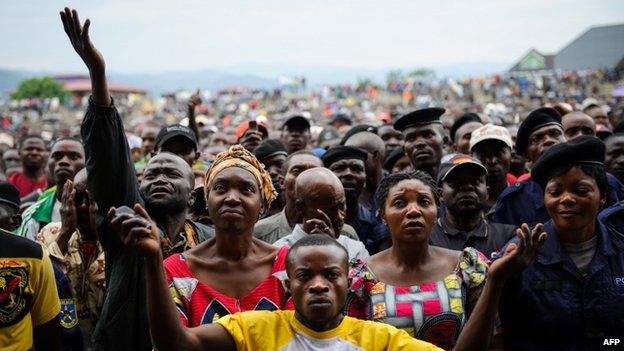DR Congo rebels lap up Goma cheers
- Published

"It was really tough in the bush," said a tall man sporting a Kalashnikov and a couple of days' worth of stubble in the city of Goma in eastern Democratic Republic of Congo.
He did not want to give his name - military orders, he said.
But he could hardly conceal his delight. After months of fighting, he was back to his hometown of Goma.
He and his fellow rebels now wield power in this city of a million inhabitants.
They had summoned the people of Goma to the main stadium, who now stood facing the raised stage, waiting apprehensively to find out what might be in store for them under rebel control.
Many were policemen. Some wore the uniform of the regular Congolese army.
One commander, brandishing a long list, claimed around 2,100 soldiers and 700 policemen had joined their ranks that morning alone.
Several dozen men in blue uniforms clambered up the steps onto the stage and deposited their Kalashnikovs in a corner.
Not all did so willingly.
Capt Loneme Corneille shrugged his shoulders.
"What can I do?" he asked as he handed over his gun.
"I have no choice but to submit."
Combative mood
By the time Lt Col Vianney Kazarama took to the stage, the stadium was almost full.
The rebel spokesman began with an apology.
The M23 movement was sorry, he said, for any suffering that had been caused by the fighting.
He promised the people of Goma order, stability, infrastructure, a better life. But he also vowed to continue the fight.
"Do you want us to stop here," he thundered into the microphone, "Or do you want us to go further?"
The crowd roared its approval.
"Do you want us to continue on to Kinshasa?"
The stadium cheered.
The rebels are in combative mood.
It seemed as if they had surprised themselves with the speed of their military success.
They certainly surprised the United Nations peacekeeping mission (Monusco).
Right up until the day Goma fell, they had been deploying helicopter gunships, firing on rebel positions north of the city, in defence of the regular Congolese army.
But on Tuesday morning, the rebels simply bypassed their base on the outskirts of the city. By this time, most Congolese soldiers had fled, leaving the streets of Goma almost deserted.
So the rebels walked into town virtually unopposed.
UN unease
With their mandate to protect the civilian population the blue-helmeted peacekeepers could do little but watch as an advance party of rebels jogged past their white armoured vehicles.
Only a very few ventured out onto the streets to welcome them.
Many residents of the city had fled the rebel advance. Others were keeping a low profile. M23's support in the city is far from overwhelming.
One senior UN official - who wished to remain anonymous - spoke with a mixture of anger and sadness about the UN's inability to hold back the rebels.
Monusco is the largest peacekeeping mission in the world. Many feel that they were put in an impossible situation: Fighting alongside an ill-disciplined national army against an apparently well-trained and surprisingly well-equipped guerrilla group.
The UN suspects the rebels of receiving extensive support from neighbouring Rwanda. The Rwandan government denies the allegations.
The peacekeepers are still in Goma. They must now share the streets of this city with the rebels.
For them it is an uneasy coexistence.
But that does not seem to bother the rebels.
"We have no problem with the United Nations," Lt Col Kazarama shrugged. His battle lies elsewhere.
"The journey to liberate [DR] Congo starts now," he told the crowd in the stadium
Several hours later, his forces reportedly took control of Sake, a crucial town to the west of Goma on the road to Bukavu, the capital of the neighbouring province of South Kivu.
Bukavu, say the rebels, is their next objective.
It is not clear whether they have the resources or the numbers to meet their ambitions.
But their morale is high, and they believe they have momentum on their side.